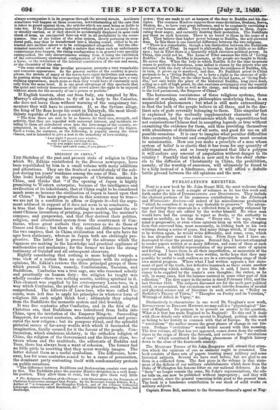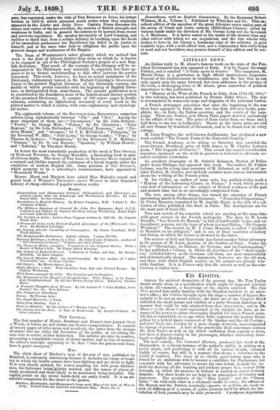PUBLICATIONS RECEIVED.
Next to a new book by Mr. John Stuart Mill, the moat welcome thing he could give us is such a couple of volumes as he has this week sent forth under the title of DISSERTATIONS AND DISCUSSIONS. They include the choicest portions of his numerous contributions to the Edinburgh and Westminster Reviews—all indeed of his miscellaneous productions "which he considers it in any way desirable to preserve." The advan- tage of having these opuscula in a collected form is greatly enhanced by the fact that they are edited by the writer himself. No other man would have had the courage to reject so freely, or the authority to amend so usefully, as he has done. "Every one," he says, "whose mind is progressive' or even whose opinions keep up with the changing facts that surround him, must necessarily, in looking back to his own writings during a series of years, find many things which, if they were to be written again, he would write differently, and some, even, which he has altogether ceased to think true. From these last I have en- deavoured to clear the present pages. Beyond this, I have not attempted to render papers written at so many different, and some of them at such distant times, a faithful representation of my present state of opinion and feeling. I leave them in all their imperfection, as memorials of the states of mind in which they were written, in the hope that they may possibly be useful to such readers as are in a corresponding stage of their own mental progress. Where what I had written appears a fair state- ment of part of the truth, but defective inasmuch as there exists another part respecting which nothing, or too little, is said, I leave the defi- ciency to be supplied by the reader's own thoughts ; the rather, as he will, in many cases, find the balance restored in some other part of this collection." The first paper in the'series is dated_February 1833, and the last October 1853. The subjects discussed are for the most part political social, or economical, but excursions are made into the domains of mental and physical science and of literature in such articles as "Bailey on Berkeley's Theory of Vision," "Thoughts on Poetry and its Varieties," Writings of Alfred de Viguy," &c.
Distinctively to characterize in one word Dr. Vaughan's new work, REVOLUTIONS IN ENGLISH IfISTORY,WO may call it a "physiological" his- tory of England. Its purpose is to present an answer to the question, What is it that has made England to be England? To this end it deals with those details only which are special to England, putting aside such as belong to her history in common with that of Europe. By the word " revolutions " the author means the great phases of change in our his- tory.- Perhaps " evolutions " would better accord with this meaning. The first volume, all that has yet appeared, comes down from the earliest times to the reign of Henry the Seventh, and reviews the "revolutions of race" which constituted the leading phenomena of English history down to the close of the fourteenth century.
The Miirreny Topics of Sir John Burgoyne will attractthat atten- tion which the opinions of one so eminent ought to command. The book consists of three sets of papers treating many military and some historical subjects. Several we have read before, but are glad to see them in a collected form. The first piece in the voliime is that state- ment of the defects of our military establishments Which drew from the Duke of Wellington his famous letter on our national defences. As the "facts" no longer remain the same, Sir John's representations, the edi- tor tells us can now be published without impropriety ; and they will prove useful, since the general reasoning holds good to the present time. The book is a handsome contribution to our stock of solid works on military subjects.
Captain Evans Bell, assistant to the Governor-Genera]e agent at Nag- pere, has reprinted, under the title of THE ENGLISH LN INDIA his letters written in 1857-8, which attracted much notice when they originally appeared in the Leader and Daily News. Captain Evans discusses the causes and course of the late rebellion the sources of British strength and weakness in India, and in general rebellion, lessons to be learned from recent and previous experience. He speakes favourably of Lord Canning, and inclines to think that from a certain delicacy in touching upon the deeds of his immediate predecessor his Excellency has failed to do justice to himself, and at the same time duly to enlighten the public upon the greatest danger and 'weaknesses of the Empire.
The Dean of Westminster's select glossary which we noticed last week is the fruit of labours distinct from those on which he is known to be engaged in aid of the Philological Society's project of a new Eng- lish dictionary. That much of the contents of the Glossary will be in- corporated in the Dictionary may naturally be expected, but there ap- pears- to be no formal understanding to that effect between the parties concerned. This week, however, we have an actual instalment of the Dictionary, rudimentary indeed, in Mr. Herbert Coleridge's Gross/au/a, INDEX to the printed English literature of the thirteenth century, the middle of which period coincides with the beginning of English litera- ture, as distinguished from semi-Saxon. The present publication is to be considered as the foundation stone of the historical and literary portion of the promised Dictionary. It consists of 102 octavo pages in double columns, containing an alphabetical inventory of every word in the printed matter to which it relates, with some explanatory and etymologi- cal matter.
The eighteenth volume of the ENcycrorNsue Barreanires comprises articles lying alphabetically between "Pla " and " Rei." Among the more important of them are—" Pneumatics," by Sir John Robison • "Poetry," by George Moir; "Poison," by Dr. Christison ; "Polar Regions," by Sir John Richardson ; "Political Economy," and "Pre- cious Metals," and " Quefmay," by J. R. Id‘Culloch ; "Polynesia," by the Reverend W. Ellis; "Poor Laws," by George Combe ; "Pope," by Thomas de Quincey; "Population," by the Reverend T. R. Malthus ; "Prussia," by Dr. G. von Bunsen; "Quakers," by William Hewitt; and "Rabelais," by Theodore Martin.
In fiction the most remarkable production of the week is THE ORDEAL or RICHARD FEVEREL by George Meredith; a fascinating book in spite of obvious faults. The story of THE LEES or BLENDON HALL repeats in a natural and lifelike manner the substance of a Greek tragedy under the conditions of modern English life. Some portions of OLD STYLES'S, which purports to be a schoolboy's reminiscences, have appeared in "Household Words."
Messrs. Hurst and Blackett have added Miss Muloch's sound and genial book A WOMAN'S THOUGHTS ABOUT WoirEw to their Standard Library of cheap editions of popular modern works.
Boons.
Dissertations and Discussions Political, Philosophical, and Historical, re- printed 'chiefly from the Edinburgh and Westminster Reviews. By John Stuart Mill. In two volumes.
Revolutions in English History. By Robert Vaughan, D.D. Volume I. Re- volutions of Race.
The Military Opinions of General Sir John Fox Burgoyne, Bart. G.C.B. Collected and Edited by Captain the Hon. George Wrottesley, Royal Engi- neers and Aide-de-Camp.
The English in India : Letters from Nagpore written in 1857-58. By Captain Evans Bell.
A Glossarial Index to the Printed English Literature of the :Thirteenth Cen- tury. By Herbert Coleridge.
An Inquiry into the Curability of Consumption. By Tames Turnbull, M.D. Third Edition.
The Encyclopedia Britannica. Eighth edition. Volume XVIII.
Railway Readings; or Prose by a Poet. By John Clarke Ferguson, Author of " The Pleasures of Music," " Poland, and other Poems."
The Poems of Heine, complete. Translated in the Original Metres. With a Sketch of Heine's Life. By Edgar Alfred Bowring.
The Ordeal of Richard _Vetere'. A History of Father and Son. By George Meredith. In three volumes.
The Lees of Blendon Hall. An Autobiography. By the Author of "Alice Wentworth," &c. In three volumes.
Old Styles's. By Henry Spicer, Esq. Emily Morton ; a Tale. With Sketches from Life and Critical Essays. By Charles Westerton, Wild Scenes amongst the Celts. The Penitent and tbeTugitive. The Memorials of the Hamlet of Knightsbridge. With Notices of its Imme- diate Neighbourhood. By the late Henry George Davis. Edited by Charles Davis.
A Woman's Thoughts about Women. By the Author of "John Halifax, Gen- &c. 8,:c. New Edition.
The Volunteers' Handbook.
Poems. By Thomas Ashe.
The Royal Barracks; a Poem.
Tales from Bentley. Part I.
Plain or Ringlets. By the Author of" Hanley Cross," Ric. The Parson and the Poor. A Tale of Hazlewood, By Austyn Graham. In
three volumes.
NEW Jounrcat.
The first number of Mesas. Bradbury and Evans's new journal ONCE A WEER, is before us, and claims our hearty commendation. It consists of twenty pages of letter-press and woodcuts, the latter from the designs of artists who are either old favourites of the public, or are taking the sure way to arrive at that distinction. The articles are nine in number, presenting a remarkable variety of choice matter, and no less of manner, the editor's principle appearing to be that " tous les genres sent bons, hors le genre ennuyeux."
MA.P.
The third sheet of hfaclure's map of the seat of war, published by Stanford, is extremely interesting because it includes the range of coun- ty in which the hostile armies have been fighting and are about to fight i
It s very clearly printed, the waters standing out with great distinct- ness, the fortresses being [plainly marked, and the names of places al- ready mentioned and those likely to be mentioned being included. The capital points on the recent battle-field are easily found. It is an ad- mirable companion for the closet or the pocket.
Maclure, Macdonald, and Macgregor'a large scale Map of the Seat of War in Italy. Traced from the Austrian Government Map. Sheet, No. 3. Demosthenes, with an English Commentary. By the Reverend Robert Whiston, M.A., Volume I. Published by Whittaker and Co. This ex- cellent edition of the speeches of the great Athenian orator makes part of the series of Greek and Latin authors (Bibliotheea Classics) edited by various hands under the direction of Mr. George Long and the Reverend A. J. Maeleane. It is better suited to the wants of the student than any other edition with which we are acquainted, and the ripe scholar who desires to have in his library a handsome copy of the orations, in good readable type, with a well-edited text, and a commentary that really helps at need and not bewilders, may possess himself of this edition and be con- tent.



























 Previous page
Previous page